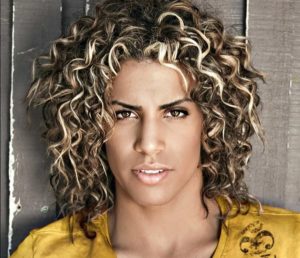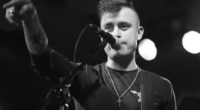
Portuguese singer Carlos Costa is eager to represent his country at the 2017 Eurovision Song Contest with what he considers a very strong and special song. Curious to know more, we talked to him about it, but also about his views on the contest in general.
2012 was the year when Carlos Costa made his first attempt in Festival da Canção, trying to transform his dream into reality. However, the final result was not good for him, finishing sixth among twelve songs on a disappointing night! Filipa Sousa was the winner… Now, 4 years later, and after his participation in The Voice of Portugal, Carlos Costa is back stronger than never and wrote on his Facebook account some weeks ago that he has a stunning song prepared for submission to next year’s national selection in Portugal, the Festival da Canção, with three versions recorded so far (Portuguese, English and Spanish).
Going to Eurovision is not just an ordinary goal for Carlos Costa, it is a lifetime dream. In the past he has received several invitations from other countries to compete for them at the Eurovision Song Contest, which he turned down as he wants to represent his home country Portugal and do what no one else ever did: Bring Eurovision to Portugal.
Where did the idea of composing a song for the Festival da Canção 2017 and eventually for the Eurovision Song Contest come from?
This song was composed aiming for the Eurovision Song Constest almost two years ago. It’s a very different song. It is not a typical one, it has a completely different structure from normal songs and it is very strong. When you listen to this music, it seems you are listening to a soundtrack of a movie, like Game of Thrones. Even in an international context, this song is different! It does not have the typical verse-chorus structure and it has a very strong message. It talks about the pitfalls in life, especially those related with “heaven and earth” promises… and after them nothing happens. In fact, I wrote the lyrics when I was angry with an episode of my life, inspired by what I felt at that moment. In my opinion as an Eurofan (not speaking as a singer), I would say this song would get a good result in Eurovision… I’m not saying this song could bring victory to Portugal, because it is all relative… it involves politics and other things…
Besides the lyrics, did you also compose the music for this song?
Well, I am the author of the main vocal melody, but I am not the composer of the instrumental orchestration, although all parts were composed in my presence.
What was your goal when you publicly announced on Facebook that you have this song prepared for the contest?
First of all, sometimes it is important to claim attention and say “Hi, I am here! I want to take my chance again!” Secondly, in fact, I always wanted to win the Festival da Canção and to represent Portugal in Eurovision. So, I am here, and if they want to count on me, let me do this, because I have a quality product. Moreover, if I win Festival da Canção someday, I will use all weapons (and a few more) to promote a good song, to make a good video clip, and going from country to country to divulge this song. I think one of the general problems is the lack of promotion of our music abroad. One of the exceptions is Suzy, who promoted her music very well and, today, she is still adored by the international Eurofans.
What do you think is the more important today in Eurovision – The song or promoting it?
Music promotion, no doubt! Of course the music has to be good… Even if you are promoting a song extremely well, if it does not have enough quality, you cannot achieve your goals. Besides this, the origin country is also important for the success of the music. A great Portuguese song in Eurovision will always have a rating below the expectations… The same has happened with Spain, which has been participating with interesting songs, but usually remains in the last ten places… Moreover, as Portugal have been participating for so many years, we do not invest in the process as we should, like Eastern European countries that invest a lot in their songs, because they actually want to be part of a process of integration in Europe. Eurovision is also a novelty for them, as they have taken part for a short time, and so they want to win and be the best! In Portugal, there are some people responsible for the Song Festival who do not have this spirit…
In your opinion, what failed in your participation in Festival da Canção, in 2012?
First, it was missing a great music! Second, it lacked interesting lyrics… And above all, lacked support! Just to have an idea, I only met my composer when I was preparing to go on stage. Then he (João Só) came to me and said “So, will we win this?”… And I was aware that this would never happen. So, I did my performance, quietly, knowing that the song would not win. In the end, I still got a second place in the televoting, which I believe was achieved due to my popularity, not due to the song. Anyway, Filipa Sousa’s song won, and it was in fact the best song among the others. And, in my opinion, it was unfair that she did not pass to the final of the Eurovision Song Contest.
And now back to your new song, was it specifically created for Eurovision? Or did you consider that possibility only after the song was finished?
After the song was finished, I realized that this was perfect for Eurovision! It is quite different from the songs we are used to listen to, as I have already said. And I thought, with a little help from RTP (Radio and Television of Portugal) in lighting, this music could work very well. I would not need LEDs, screens behind me, none of that… Just a good set of lights, a good sound, and some good foregrounds.
You have recorded this song in Portuguese, English and Spanish. Despite the current restrictive rules of Festival da Canção concerning the language of the lyrics, if you had the possibility to choose one of them, what would be your choice for Eurovision?
The song was written in English first. So, it will always make more sense to be sung in English, although the Portuguese version is also quite acceptable. However, regarding the subject of the song, and given that English is always the best way to spread a message up to an international level, I think we would have much to gain if we present this song in English. But if RTP does not allow this, I think the Portuguese version could do very well, since the strength of this song lies in its melody and orchestration. It sounds like a soundtrack of an epic movie!
In your Facebook publication, you also said that Switzerland has approached you…
When I participated in the Swiss selection for Eurovision with a song called “Move On”, I got a contacts to the television station from a responsible for the festival’s local organization. This year, I received an e-mail from him, asking if I had some music to send. I said that, in fact, I had one, but shortly afterwards the rules of their contest were announced and it was decided not to accept themes from composers abroad. Anyway, they said they will contact me again, another year.
What do you think would be the best way to select a Portuguese song to for the Eurovision Song Contest – through an internal selection or through a national final?
To be honest, I love competition. I have participated in many, and l will always prefer Festival da Canção, as the method of selection. First, because it is the audience choice, and it should be allowed to express by whom it wants to be represented. The internal choices are always seen as decisions taken exclusively by the broadcaster and people end up losing interest in the trajectory of the song because they do not participate in the selection process. My opinion is that I think that Festival da Canção should be better planned, in order to avoid bizarre situations like Homens da Luta, the winner of the 2011’s Festival da Canção, which was chosen by the audience and, therefore, no one can complain, even this victory was ridiculous. So, I think televoting should be the main criterion for choosing the song for Eurovision. It is a serious process, since vote system is audited, the votes are certified, it is known how many votes were assigned to each song and so on. But we must have quality songs, unless we will end up being represented by weak songs.
What about artists and composers? Should the Festival da Canção include different nationalities for televoting, as is the case with some countries?
Well, I do not know… I think the best is to open enrollment for national singers and artists, with televoting deciding 100%. There is no perfect method.
When it comes to Eurovision, what do you think Portugal is doing wrong?
I think we would gain a lot if we sang in English. Its’s sad because our language is always ours. But unless all the countries are obliged to sing in their mother-language, we should sing in English. Even the Ukrainian song which won Eurovision this year was not fully sung in English, but English was there and, in what concerns the message, the singer did everything possible for everybody to understand it. And you also have examples such as Serbia in 2007, who managed to transmit all that she sang, even though nobody understood what she said. We felt the message. But most songs do not have that kind of strength. English is needed to do that.
And what if you take place in Festival da Canção, next year, and do not win, would you try again?
I really do not know… After applying and if things go wrong, we really understand why. From then on, we have thousands of reasons to decide to come back, or not… If they repeat what they did to me in 2012, I would not participate again. This is as true as the fact of some years having gone by and I did not return there, even when I had an invitation, as it was the case in 2015. I regularly receive invitations for Eurovision, whether it is from Bulgaria, Romania, Cyprus, Moldavia and so on, there are composers who want me to join them, but I would prefer to go through Portugal.
Finally, what is your favorite song of the Eurovision Song Contest?
“Euphoria”, by Loreen, mainly because I love the artist that she is… Undoubtedly, she is one of the most inspiring people in my daily life.
EuroVisionary would like to thank Carlos Costa for taking the time to talk to us and we wish him the best of luck. In the video below, you can watch his lastest single My Ghetto.





















